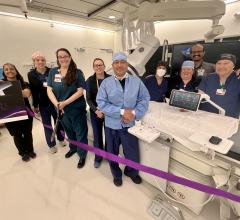
Getty Images
Stroke recovery is a challenging process that extends for months after hospital discharge. Issues like cognitive impairment and social determinants of health (SDOH) hurdles often go unrecognized until patients are home. To improve outcomes and be in compliance with new regulations, it's crucial to better identify and address these issues during the recovery period. With the rise of digital health, innovative solutions are emerging that can significantly impact patient care and recovery while simultaneously addressing health equity.
Navigating Post-Stroke Recovery at Home: One Patient's Experience
A ”mildly impaired” stroke patient with atrial fibrillation who was discharged reported, “I knew my local pharmacist, and they knew my prescriptions. I had had a heart attack previously. After the stroke, I had new prescriptions, and this was the first obstacle for me. I couldn’t dispense my medications into daily doses. The math required to do that was beyond my ability. This math deficit was not recognized until I got home. I lived alone and I had to take care of myself, and I was unable to cope. The simple act of maintaining post-care medications was extremely difficult for me. I know the nurse explained my medications to me at the hospital. If you had asked me if I received discharge instructions, I would have checked the box ‘yes’. I could hear the discharge information, but I had no idea how it would manifest itself at home. In the hospital, I could show I could give myself an injection so that I could take anticoagulants at home. But my medications needed to be interpreted in terms of dosage and frequency.”
This case illustrates the risks of inadequate social and functional assessment and need for improved post-discharge care. Prescribing medications for individuals with multiple chronic conditions without adequate assessment of their physical and cognitive status, ability to afford the medicines prescribed, or availability of needed assistance to manage medications can contribute to non-adherence, adverse events, and ultimately lead to poor outcomes. These unmet needs increase risk for readmissions, especially among vulnerable populations and those with newly-acquired disabilities1 (HR: 1.66, 95% CI: 1.01–2.73).
The Need for Actionable SDOH Screening in Clinical Care
Incorporating social and functional determinants of health and interventions into the clinical management of chronic conditions can improve health management and outcomes. Yet incorporating screening and knowledge of social determinants of health at the point of clinical decision is rarely done. Even when social determinants of health (SDOH) are screened, they do not guide the development of actionable clinical care plans that are meaningful to the patient for their health management or recovery.
This missing puzzle piece matters now more than ever. In January 2024, the Centers for Medicare and Medicaid Services (CMS) began requiring health care organizations to screen for five social factors:
- Food insecurity
- Interpersonal safety
- Housing insecurity
- Transportation
- Utilities
The purpose of these screenings is to encourage engagement of community-based organizations with resources to address SDOH. Another goal is to use the data to stratify patient risk for assessment of health system performance. However, there is no guidance on how these social factors should inform healthcare providers’ clinical decisions. Managing health and engaging patients requires moving beyond documentation of SDOH to actually incorporating comprehensive SDOH data into individualized actionable care plans tailored to each patient’s health condition and social and functional circumstances. In other words, we need to actually apply SDOH data to care plans to make the information actionable.
Harnessing Digital Health: The Impact of Emerging Solutions
Innovative digital solutions can support care providers to quickly assess social and functional determinants of health and engage patients and caregivers to manage their health and improve health outcomes. For example, clinicians and researchers at Atrium Wake Forest Baptist Health developed a digital health platform, StrokeCP, that was developed and utilized with high satisfaction in the COMPASS Study in 41 health systems and is now being used to quickly assess the social and functional determinants of health. The digital health tool automatically generates care plans that include links to individualized community-based resources. Patients are surveyed two days after being discharged from the hospital and asked 15 questions that enable providers to capture social and functional determinants of health at the point of care to determine what barriers might interfere with a patient’s recovery. It also facilitates interactions between patients and providers throughout the stroke recovery journey.
This solution points to an emerging trend in digital health. Technology tools are becoming more sophisticated, bidirectional and disease-specific, and are being designed with home care in mind. These promising solutions promise to transform stroke recovery by ensuring patients have comprehensive support throughout their recovery. By embracing these cutting-edge health solutions, we have an opportunity to revolutionize stroke recovery and ensure all patients have the resources they need for a healthier future.

Pamela W. Duncan, PhD, PT, FAPTA, FAHA, is Founder and CEO of Care Directions. She is also Research Scholar and Adjunct Professor of Internal Medicine and Retired Professor (Department of Neurology), and one of the most influential post acute clinicians, researchers, innovators and advocates. In 2020, she received the AHA/ASA David Sherman award for her lifetime contributions to post acute stroke care, research, training, innovation, and advocacy (https://youtu.be/G7k_5tzoG8g ). Duncan is President and Co-Lead of Care Directions, a start-up to commercialize digital health solutions to transform post acute care access, stroke recovery, and secondary prevention. She received her BS degree in Physical Therapy from Columbia University and a PhD in Epidemiology from the University of North Carolina. Her previous academic affiliations were with Duke University, University of Kansas, University Florida and the Department of Veterans Affairs. She was PI of the VA Rehabilitation Outcomes Research Center and was C0-PI of the University of Kansas Pepper Center She joined the Wake Forest Faculty in 2011 to develop and evaluate innovative models of care to manage post-acute services for patients with medically and socially complex chronic conditions. She was the principal investigator of a PCORI funded large pragmatic trial to implement and evaluate an evidenced-based COMprehensive Post-Acute Stroke Services (COMPASS) model.
Reference:
[1] 1Bogaradus ST, Towle V, Williams CS, Desai MM, Inouye SK. What does the medical record reveal about functional status? A comparison of medical record and interview data . J Gen Intern Med 2001: 16(11) 728-236


 January 29, 2026
January 29, 2026 









